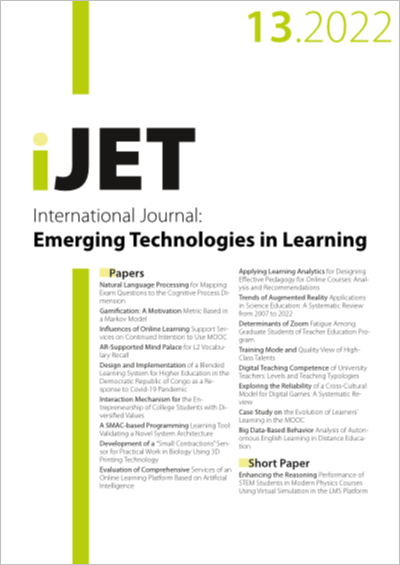Applying Learning Analytics for Designing Effective Pedagogy for Online Courses: Analysis and Recommendations
DOI:
https://doi.org/10.3991/ijet.v17i13.28873Keywords:
Online learning, Online teaching, Online courses, Feedback, Learning experience, COVID 19, Learner behaviour, Quality of Online course, Pedagogy, Learner engagement and retentionAbstract
The countrywide lockdown since March 2020 due to COVID 19 pandemic has brought drastic changes in the Indian education system. Today, many higher education institutions offer online delivery as an alternative and/or addition to provide more flexibility to learners, specifically in the current COVID 19 Pandemic. The conventional teaching method to the technology-driven virtual mode of teaching provided opportunities with challenges to academic stakeholders. Now with the new session, discussions on the reopening of educational institutions are going on. Hence, it is time to review the learning that took place during this pandemic situation. Learners being confronted with such services come with different expectations of what that means to their learning paths and behaviors. Learning Analytics is a relatively new and innovative way of making learner behavior and performances explicit by analyzing significant learners' feedback data. In this study, we take the case of online courses offered by various educational institutions all over India, and the analysis encompasses the population of learners of the online courses during the COVID 19 Pandemic period. Primary data has been collected using Google form when journals, reports, and websites are secondary data collection sources. We classified the data into distinctive parts: the overall learning experience of this course, the fulfillment of the learners' objectives, the difficulty of the assignments, the quality of the material supplied, the difficulty level of the course, the quality of the live session, opinion about the virtual approach of teaching, opinion about the contribution of virtual academic programs on knowledge building, opinion about the impact of virtual mode of teaching on performance, and opinion about the causes affecting students’ performance in the virtual mode of learning. The analysis outcomes will guide the host institutions and other similar institutions to design their pedagogy for future online courses more effectively, influencing learner engagement and retention.
Downloads
Published
How to Cite
Issue
Section
License
Copyright (c) 2022 Dr. Muralidhar Kurni, Dr. Saritha K, Dr. Mujeeb Shaik Mohammed , Mr. Sheikh Gouse

This work is licensed under a Creative Commons Attribution 4.0 International License.



